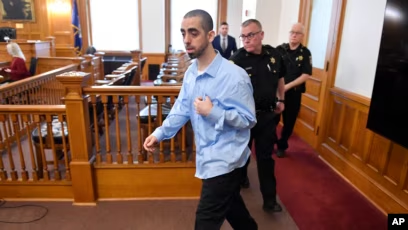The trial of Hadi Matar, the man accused of attacking renowned author Salman Rushdie in August 2022, has begun, drawing global attention to the shocking incident that left Rushdie with life-altering injuries. The attack, which occurred at a literary event in Chautauqua, New York, has reignited discussions about freedom of expression, religious extremism, and the resilience of artists in the face of violence.
The Attack: A Brutal Assault on Free Speech
On August 12, 2022, Salman Rushdie was preparing to speak at the Chautauqua Institution Amphitheater when Hadi Matar, a 27-year-old from New Jersey, rushed onto the stage and stabbed him multiple times. The attack, which lasted mere seconds, left Rushdie with severe injuries, including the loss of sight in one eye and permanent damage to his hand. Witnesses described the scene as chaotic, with bystanders intervening to restrain Matar until law enforcement arrived.
The Trial: Justice and Accountability
The trial, taking place at the Chautauqua County Courthouse in Mayville, New York, has seen opening statements from both the prosecution and defense. Rushdie is expected to testify, marking the first time he will face Matar since the attack. Matar, who has pleaded not guilty to charges of attempted murder and assault, faces a potential 32-year prison sentence if convicted. His defense strategy remains unclear, though his courtroom outbursts, such as shouting “Free Palestine,” have added a layer of complexity to the proceedings.
Motivations Behind the Attack
The attack on Rushdie is deeply tied to the controversy surrounding his 1988 novel, The Satanic Verses, which led to a fatwa calling for his assassination by Iran’s then-supreme leader Ayatollah Khomeini. Matar’s alleged connections to Hezbollah, a militant group backed by Iran, have raised questions about whether the attack was motivated by religious extremism or political ideology.
Rushdie’s Resilience: Turning Pain into Art
Despite the physical and emotional toll of the attack, Rushdie has shown remarkable resilience. In his memoir, Knife: Meditations After an Attempted Murder, he reflects on the incident, his recovery, and his determination to continue writing. For Rushdie, the act of writing about the attack is a way to reclaim control and respond to violence with art.
Conclusion
The trial of Hadi Matar is not just about seeking justice for Salman Rushdie; it is a broader commentary on the dangers faced by writers who challenge societal norms and the enduring importance of free expression. As the trial unfolds, the world watches closely, reminded of the power of words and the courage of those who refuse to be silenced.
Disclaimer: The information in this article is based on online sources and is subject to verification. Readers are encouraged to cross-check details, as the author and publisher assume no responsibility for inaccuracies or actions taken based on this content.
